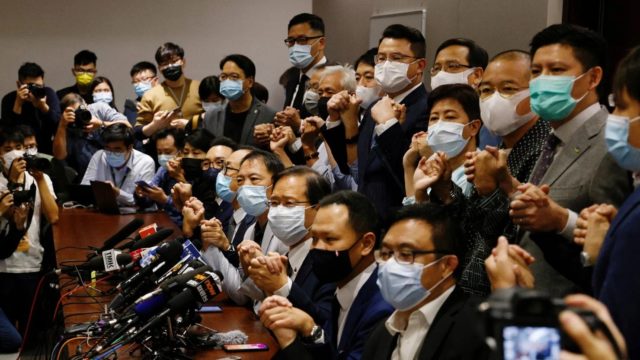
Fifteen pro-democracy lawmakers in Hong Kong announced their resignation on Wednesday over the ousting of four pro-democracy members of the territory’s Legislative Council (LegCo).
Earlier in the week, China’s National People’s Congress Standing Committee passed a resolution allowing Hong Kong’s executive to remove legislators that threaten independence from the mainland or broadly defined “national security.” The ruling gives the Communist Party a de-facto veto over the territory’s body and makes such actions ineligible for judicial review.
Beijing-backed Chief Executive Carrie Lam promptly took up her new power, dismissing four lawmakers. These pro-democracy individuals were already banned from reelection for making allegedly taking “unsincere” oaths of office.
During a press conference to announce his resignation with his fourteen colleagues, Fernando Cheung, described the mood as “definitely the darkest day in Hong Kong so far.” He continued, “This move makes it clear that dictatorship has descended onto Hong Kong and that Chinese Communist Party can eradicate all opposing voices in the legislature. There’s no more separation of powers, no more ‘one country, two systems,’ and therefore no more Hong Kong as we know it.”
With Beijing loyalists already comprising the majority of LegCo’s 70 member assembly, the pro-democracy legislators’ departure will not significantly impact the chamber’s ability to pass mainland-friendly legislation.
The Chinese government has opportunistically timed its latest escalation against Hong Kong’s autonomy while most of the world watches the aftermath of the U.S. Presidential election. However, British Foreign Secretary Dominic Raab criticized Beijing’s latest push saying the “campaign to harass, stifle and disqualify democratic opposition tarnishes China’s international reputation and undermines Hong Kong’s long-term stability.” The UK has considered issuing up to three million passports for Hong Kong residents with links to the former colonial ruler.
China’s latest crackdown comes months after a controversial law enabling easier extradition of Hong Kong residents to mainland China went into effect over the summer. Over a million people from the territory took to the streets to protest the law and political repression in what veteran journalist Claudia Rosett characterized for the JPC as the territory’s “finest hour.”
Washington continues to impose new sanctions on the mainland and Hong Kong officials for anti-democratic behavior. The Treasury and State Departments already sanction Lam but added restrictions to four other high ranking security and political officials this week. Policymakers have also considered removing preferential trade status for territory, as well as denying Hong Kong’s banks access to the U.S. Federal Reserve.

